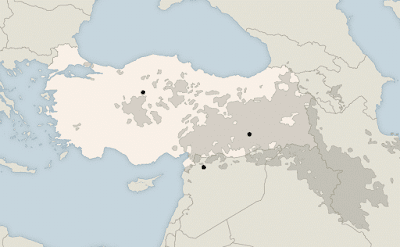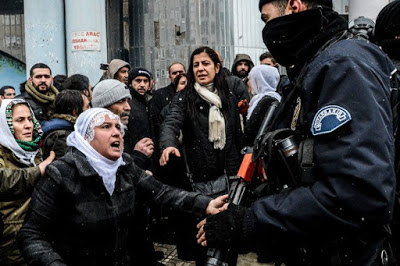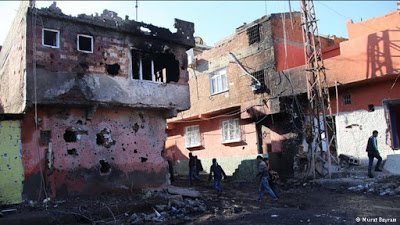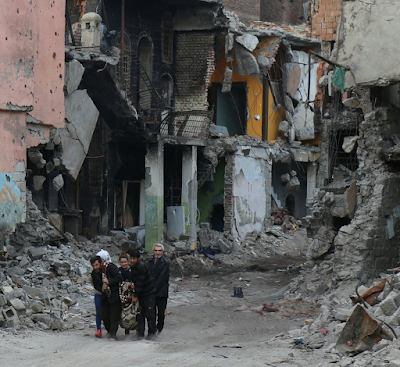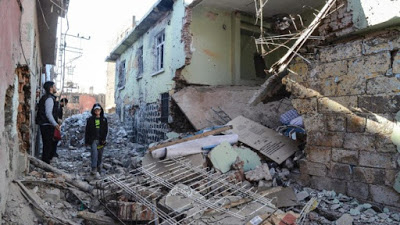An Aleppo-like Landscape in
a Kurdish Redoubt of Turkey
a Kurdish Redoubt of Turkey
Amidst
the hypocritical condemnation by the West of Russia and Assad’s assault on
Aleppo, we should remember the silent war on the Kurds of South Turkey. We can see in these pictures scenes which
would not be out of place either in Aleppo, Mosul or Yemen but only the former
receive any publicity.
the hypocritical condemnation by the West of Russia and Assad’s assault on
Aleppo, we should remember the silent war on the Kurds of South Turkey. We can see in these pictures scenes which
would not be out of place either in Aleppo, Mosul or Yemen but only the former
receive any publicity.
As the Turkish tyrant Erdogan consolidates his rules by arresting and torturing thousands, the West averts its eyes as Turkey is an essential component of the NATO alliance. Putin also says nothing since his quarrel with Erdogan has been patched up. Erdogan has come to accept that in the war against the Kurds, he has to make up and be friends with the Syrian regime of Assad.
Although at the moment the Kurds are supported by the United States we have to prepare for a time when, once again, the Kurds are betrayed by the great powers and abandoned to the genocidal regime of Ataturk’s successor, the Islamist Erdogan.
Tony
Greenstein
Greenstein
By ROD NORDLANDDEC.
24, 2016
24, 2016
 |
| A damaged apartment building after an explosion in November in the southeastern Turkish city of Diyarbakir. Credit Ilyas Akengin/Agence France-Presse — Getty Images |
DIYARBAKIR,
Turkey — It was the end of the day in an underground tavern with no name.
Beneath a domed Ottoman ceiling, with the lights down low and the music muted,
patrons could just hear a distant rumbling through the basalt block walls, five
centuries old.
Turkey — It was the end of the day in an underground tavern with no name.
Beneath a domed Ottoman ceiling, with the lights down low and the music muted,
patrons could just hear a distant rumbling through the basalt block walls, five
centuries old.
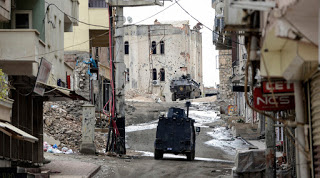 |
| Military vehicles move a deserted street of Silvan, southerneastern Turkey, during a curfew following clashes between Turkish forces and Kurdish militants on November 10, 2015. © Ilyas Akengin / AFP |
“Bulldozers,”
explained the waiter, who also had no name. He was clearing the table. The
bulldozers were clearing the rubble away from what used to be residential
neighborhoods here in the Sur municipality of Diyarbakir city, the informal
Kurdish capital and former stronghold of the outlawed Kurdish group, the
Kurdistan Workers’ Party, or P.K.K.
Parts of Diyarbakir, the de facto capital of Turkey’s Kurdish regions, have been under a Turkish army imposed curfew for two months now. Tom Stevenson reports from a destroyed city under siege.
On a
video monitor a soulful version of Leonard Cohen’s “Dance
Me to the End of Love” played, the audio coming from speakers
scattered in nooks. The waiter turned up the volume with a remote.
video monitor a soulful version of Leonard Cohen’s “Dance
Me to the End of Love” played, the audio coming from speakers
scattered in nooks. The waiter turned up the volume with a remote.
It has
been more than a year since the fighting started in Sur, with young supporters
of the P.K.K. guerrillas digging trenches and manning barricades, and more than
four months since that fighting ended, with at least 120 civilians, P.K.K. and
Turkish security forces killed and scores of homes and buildings destroyed.
been more than a year since the fighting started in Sur, with young supporters
of the P.K.K. guerrillas digging trenches and manning barricades, and more than
four months since that fighting ended, with at least 120 civilians, P.K.K. and
Turkish security forces killed and scores of homes and buildings destroyed.
The Turkish Army and police won, but victory
brought an Aleppo-like landscape. Two dozen acres of the old city have been
cleared of the rubble so far, leaving a featureless circular gash on aerial
maps. The damage is mostly invisible from street level though, because
alleyways leading up to the most devastated areas have been walled up where
they intersect with streets that have reopened for business. Three of Sur’s
neighborhoods still remain under curfew.
brought an Aleppo-like landscape. Two dozen acres of the old city have been
cleared of the rubble so far, leaving a featureless circular gash on aerial
maps. The damage is mostly invisible from street level though, because
alleyways leading up to the most devastated areas have been walled up where
they intersect with streets that have reopened for business. Three of Sur’s
neighborhoods still remain under curfew.
The only
apparent entry road to the leveled heart of Sur has a huge curtain strung from
building to building across it, and a Scorpion armored police vehicle parked in
front painted a menacing shade of black instead of the usual white.
apparent entry road to the leveled heart of Sur has a huge curtain strung from
building to building across it, and a Scorpion armored police vehicle parked in
front painted a menacing shade of black instead of the usual white.
Sur was
one of the most pro-P.K.K. neighborhoods of the heavily pro-P.K.K. city of
Diyarbakir, the biggest Kurdish city in the world and the unofficial capital of
Turkey’s
eastern Kurdish regions. Kurds make up an estimated sixth of Turkey’s population,
and most of them either openly support the outlawed P.K.K., or vote for the
legal party, the Kurdish Peoples’ Democratic Party, or H.D.P., which shares
much of the guerrillas’ political platform.
one of the most pro-P.K.K. neighborhoods of the heavily pro-P.K.K. city of
Diyarbakir, the biggest Kurdish city in the world and the unofficial capital of
Turkey’s
eastern Kurdish regions. Kurds make up an estimated sixth of Turkey’s population,
and most of them either openly support the outlawed P.K.K., or vote for the
legal party, the Kurdish Peoples’ Democratic Party, or H.D.P., which shares
much of the guerrillas’ political platform.
The name
“Sur” means “city wall,” and refers to the 16-foot-thick ancient Roman walls,
longer than Jerusalem’s and better preserved than Rome’s, which loop around the
municipality and embrace the older parts of Diyarbakir. Once a magnet for
tourists, Sur is now festooned with numerous little police posts, parked
Scorpions everywhere, and plainclothes officers sauntering around with assault
rifles and holstered pistols.
“Sur” means “city wall,” and refers to the 16-foot-thick ancient Roman walls,
longer than Jerusalem’s and better preserved than Rome’s, which loop around the
municipality and embrace the older parts of Diyarbakir. Once a magnet for
tourists, Sur is now festooned with numerous little police posts, parked
Scorpions everywhere, and plainclothes officers sauntering around with assault
rifles and holstered pistols.
About the
only foreign visitors to Sur these days are occasional European leftists
showing solidarity, and foreign journalists, who seem to get arrested on sight
— two on a recent Saturday, just a day before my visit.
only foreign visitors to Sur these days are occasional European leftists
showing solidarity, and foreign journalists, who seem to get arrested on sight
— two on a recent Saturday, just a day before my visit.
“You
journalist?” asked the waiter, who preferred to be nameless than be jailed.
“Don’t worry, you can trust us.”
journalist?” asked the waiter, who preferred to be nameless than be jailed.
“Don’t worry, you can trust us.”
He
recommended an Assyrian red, a young wine from a combination of local grape
varieties, okuzgozu and bogazkere,
served slightly chilled in a large goblet. “Homemade, 100 percent organic.” He
poured it from a bottle with no label.
recommended an Assyrian red, a young wine from a combination of local grape
varieties, okuzgozu and bogazkere,
served slightly chilled in a large goblet. “Homemade, 100 percent organic.” He
poured it from a bottle with no label.
This may
sound corny, but on the video monitor “We
Are the World” started playing (showing Cyndi Lauper recording her
segment). Possibly that was the waiter’s idea. He got right to the point
without being asked a question. “Every day my friends are going to the
mountain, teachers, lawyers, doctors, so many,” he said. “There is no one who
believes in talking anymore.”
sound corny, but on the video monitor “We
Are the World” started playing (showing Cyndi Lauper recording her
segment). Possibly that was the waiter’s idea. He got right to the point
without being asked a question. “Every day my friends are going to the
mountain, teachers, lawyers, doctors, so many,” he said. “There is no one who
believes in talking anymore.”
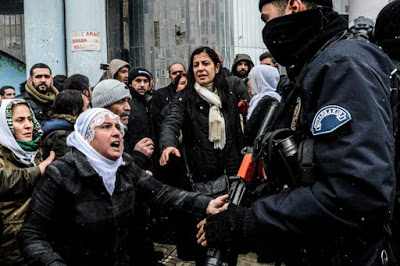 |
| Police officers stood guard last December in Diyarbakir during a demonstration after a curfew was lifted. Credit Ilyas Akengin/Agence France-Presse — Getty Images |
The
fighting in Sur was mirrored in half a dozen other Kurdish towns and districts,
the first time the 40-year-old Kurdish conflict in Turkey had erupted on such a
scale in urbanized areas. While the fighting mostly ended last spring, arrests
of people accused of supporting the P.K.K. have gone on ever since, punctuated
by terrorist bombings blamed on the P.K.K.
fighting in Sur was mirrored in half a dozen other Kurdish towns and districts,
the first time the 40-year-old Kurdish conflict in Turkey had erupted on such a
scale in urbanized areas. While the fighting mostly ended last spring, arrests
of people accused of supporting the P.K.K. have gone on ever since, punctuated
by terrorist bombings blamed on the P.K.K.
After a
failed coup in July — which had nothing to do with Kurds — the Turkish
government declared a state of emergency and used those powers to greatly
increase arrests of mainstream politicians, especially here in Diyarbakir.
failed coup in July — which had nothing to do with Kurds — the Turkish
government declared a state of emergency and used those powers to greatly
increase arrests of mainstream politicians, especially here in Diyarbakir.
The
Kurdish journalist Sedat Yilmaz pulled up a chair and the waiter also poured
him a glass of the Assyrian red. Mr. Yilmaz’s online news agency — like nearly
all Kurdish publications — has been shut down under the emergency powers.
Kurdish journalist Sedat Yilmaz pulled up a chair and the waiter also poured
him a glass of the Assyrian red. Mr. Yilmaz’s online news agency — like nearly
all Kurdish publications — has been shut down under the emergency powers.
“Eman
Dilo,” a folk tune by the Kurdish folk singer, Mihemed Sexo, was up
on the screen. Like most Kurdish music, it sounds mournful to polyphonic ears.
Often, as in “Gulazer” by Bremen Mizikacilari, it also involves
an array of instruments hardly anyone knows the names of. (There were things
that looked like cymbals, but they were operated by feet.)
Dilo,” a folk tune by the Kurdish folk singer, Mihemed Sexo, was up
on the screen. Like most Kurdish music, it sounds mournful to polyphonic ears.
Often, as in “Gulazer” by Bremen Mizikacilari, it also involves
an array of instruments hardly anyone knows the names of. (There were things
that looked like cymbals, but they were operated by feet.)
Mr.
Yilmaz had tears in his eyes, not from the music. “This is my first time back
to Sur since it all happened,” he said.
Yilmaz had tears in his eyes, not from the music. “This is my first time back
to Sur since it all happened,” he said.
The
tavern was half full. Ten other customers were at several tables but the waiter
said there was nothing to worry about in talking to any of them. The only
pro-government people in Sur, he said, were the police.
tavern was half full. Ten other customers were at several tables but the waiter
said there was nothing to worry about in talking to any of them. The only
pro-government people in Sur, he said, were the police.
And there
were no plainclothes officers in the tavern with no name.
were no plainclothes officers in the tavern with no name.
Anyway,
said Mr. Yilmaz, “Nowadays we don’t even worry about arrest. We worry about
death.”
said Mr. Yilmaz, “Nowadays we don’t even worry about arrest. We worry about
death.”
Four
Kurdish men in their late 20s, all old friends, were at one table sipping from
curved tea glasses, and at first wanted to give their full names, but then
thought better of it. They had all recently lost their jobs in the purges of
more than 100,000 state employees that followed the failed coup.
Kurdish men in their late 20s, all old friends, were at one table sipping from
curved tea glasses, and at first wanted to give their full names, but then
thought better of it. They had all recently lost their jobs in the purges of
more than 100,000 state employees that followed the failed coup.
Two were
teachers who had participated in a one-day protest strike here, and all
strikers were fired. One was an auditor for a government office who was forced
out of his job because, he said, he subscribed to a now-banned Kurdish
newspaper. Mahmut, who gave his first name only, was a manager in a government
office, purged just three days earlier without any clear reason. He was told
his continued employment would be “inconvenient,” he said.
teachers who had participated in a one-day protest strike here, and all
strikers were fired. One was an auditor for a government office who was forced
out of his job because, he said, he subscribed to a now-banned Kurdish
newspaper. Mahmut, who gave his first name only, was a manager in a government
office, purged just three days earlier without any clear reason. He was told
his continued employment would be “inconvenient,” he said.
“They
cannot discipline us by taking our bread from our hands,” Mahmut said. “We want
our collective rights. They don’t want any democratic space for anyone, they
destroyed every peaceful means and our young people, they have no other
solution, they’re going to the mountain, there is no other way.”
cannot discipline us by taking our bread from our hands,” Mahmut said. “We want
our collective rights. They don’t want any democratic space for anyone, they
destroyed every peaceful means and our young people, they have no other
solution, they’re going to the mountain, there is no other way.”
“Going to
the mountain” is what people say here about joining the P.K.K., whose redoubts
are in the rugged mountains of northern Iraq. Nearly every family in Kurdistan
has someone up there, or knows someone, or has had someone come back down, to
be buried.
the mountain” is what people say here about joining the P.K.K., whose redoubts
are in the rugged mountains of northern Iraq. Nearly every family in Kurdistan
has someone up there, or knows someone, or has had someone come back down, to
be buried.
One of
the other men, the Kurdish newspaper reader (who has a master’s degree in
Kurdish literature), reminded everyone of the bulldozers. “Just near us, all of
Sur is demolished, almost a year and they’re still clearing it up,” he said.
“They’re still finding pieces of human bodies in the rubble.”
the other men, the Kurdish newspaper reader (who has a master’s degree in
Kurdish literature), reminded everyone of the bulldozers. “Just near us, all of
Sur is demolished, almost a year and they’re still clearing it up,” he said.
“They’re still finding pieces of human bodies in the rubble.”
Everyone
lapsed into silence, staring at the dregs in their glasses. Bob Dylan’s “Subterranean
Homesick Blues” played.
lapsed into silence, staring at the dregs in their glasses. Bob Dylan’s “Subterranean
Homesick Blues” played.
Posted in Blog
